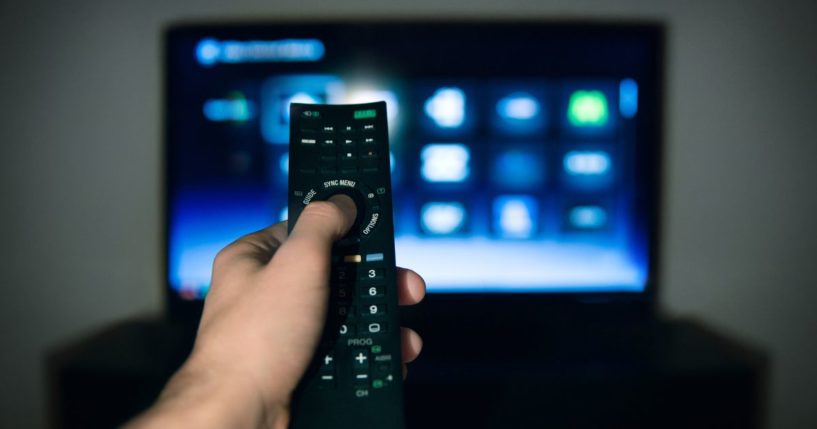
Scaros: What Makes You Believe the Politicians and Journalists You Support?
When poll after poll reveals that Americans don’t trust their government, or the media, it’s no surprise. You probably feel the same way. I do too.
But here’s what’s fascinating: Those same Americans who don’t trust “the other side” somehow trust their own. There’s a great case to be made about how “they lie,” but where’s your objective evidence that “we tell the truth”?
Too many of us determine — correctly, in many cases — that those talking heads on the cable channels we never watch are liars and that the politicians they support are cheats, yet have no problem concluding that those on the channels we do watch are telling us the truth, and the candidates we support are too.
There seems to be a correlation between morality and the ideology formed in people’s minds.
For close to a hundred years now, the main difference between Democrats and Republicans has been the role of government.
Since the government works for us, not the other way around, think of our elected officials — Congress members, governors, even the president — as our personal shoppers. We give them money to buy us things, like bridges, roads and armies.
If we think the government is a smart shopper, we want it to be in charge of solving most problems, even if we have to give it more money (aka taxes) to do so. Or even if we have to give it money by putting it on our credit card (deficit and debt).
However, if we think the government is generally a bad shopper — a spendthrift at best or a thief at worst — we want it to stay out of the way and have a far more limited role.
Since the days of FDR and later LBJ, Democrats have believed that the government is a good shopper. Then, Ronald Reagan came along and famously quipped: “Government is not the solution to the problem; government is the problem.” That was a turning point for Republicans, as Reagan managed to reverse FDR’s New Deal and LBJ’s Great Society momentum.
Another vivid difference between Democrats and Republicans is on social issues. Generally, Democrats are more progressive and Republicans more traditional. From abortion to religion to binary pronouns, the differences are sharp and are becoming even sharper.
That’s why roughly half of America turns to CNN to listen to Don Lemon talk about what a great president Joe Biden is, and how lucky we are that we don’t have to deal with Donald Trump any longer, while the other half tunes in to Fox News to hear Sean Hannity say the opposite.
Except for Americans who have no interest in or knowledge about politics — who’ll vote for a candidate based on name, physical appearance, or some other factor that has nothing to do with the actual issues — most Americans have a good sense of what each major party stands for, and by and large will vote for that party all or most of the time.
Human beings in general like to hear views with which they already agree, and so they’ll tune in to their comfort food feeding trough to hear Lemon talk about how Trump destroyed America or Hannity say how Trump saved it.
All of that makes sense. Except when it comes to whom we trust and whom we believe. Why is it that so many of us think “our side” — whether it be politicians or the TV pundits who talk about them — is morally superior to the other and inherently more trustworthy?
If Biden says “Republicans want to cut Social Security and Medicare,” Republicans rush to call him a liar. Yet when they receive a Trump campaign blast that “Biden wants to give illegal aliens the right to vote” (something he never said), Republicans automatically assume that’s true. Are Republicans incapable of lying or cheating?
Democrats do the same thing. When Trump spoke about how under the Obama administration, Trump Tower was bugged, they laughed it off as another Trump tall tale. When Republicans brought up Hunter Biden’s laptop, Democrats couldn’t even fathom that their saintly party could be capable of such things.
I despise lies, and I think honesty is the best quality in a human being. But I do not necessarily expect or need that from my president or from the person who brings me the news. Sure, it would be nice, but as I know neither of them personally, it would be foolish of me to make a determination about their character because they have the same views on the issues as I do.
For example, I believe Republicans have better views on securing the border, but I don’t believe Democrats hate America. Conversely, Democrats shouldn’t believe that Republicans who want to end transnational trespass do so because they’re racists who hate black and brown people.
All of that is just media comfort food propaganda designed to drive up ratings.
Sure, some newspapers and telecasts are better than others, but all are far from ideal. I can’t wait for someone to come up with a show called “Nothing to See Here, Folks.” It might get canceled because people won’t tune in if it’s not a pure, absolute battle between what they’ve been told is good vs. evil.
But it would be honest and go a long way toward restoring trust.
The views expressed in this opinion article are those of their author and are not necessarily either shared or endorsed by the owners of this website. If you are interested in contributing an Op-Ed to The Western Journal, you can learn about our submission guidelines and process here.
Truth and Accuracy
We are committed to truth and accuracy in all of our journalism. Read our editorial standards.
Advertise with The Western Journal and reach millions of highly engaged readers, while supporting our work. Advertise Today.












